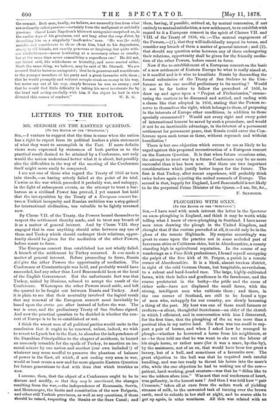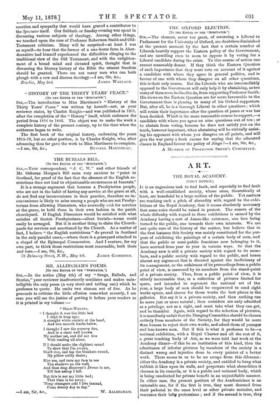PLOUGHING WITH OXEN.
[TO THIS EDITOR OF THE "SPECTATOR.")
Sin,—I have read with much interest the letter in the Spectator on oxen-ploughing in England, and think it may be worth -while telling what I know of oxen-ploughing in Scotland. I have never seen oxen drawing the plough in the United Kingdom, and ,thought that if the custom prevailed at all, it could only be in the glens of the remote Highlands. My surprise accordingly was great to come upon the practice not in some secluded part of Inverness-shire or Caithness-shire, but in Aberdeenshire, a county standing high in agricultural reputation. In the course of my wanderings as a Free-Kirk probationer, I found myself occupying the pulpit of the free kirk of St. Fergus, a parish in a remote corner of Aberdeenshire. It is a bleak, almost treeless district, in sight of the cold German Ocean, but hospitable, nevertheless-, to a robust and hard-headed race. The large, highly-cultivated farms, with their ladies and gentlemen in the farmhouse, and the coarse proletariat in the botby—the pride and the curse of richer soils—have not displaced the small farms, with the strong, intelligent men who cultivate them ; and there, in the one corner of Scotland, are still to be found a type of men who, unhappily for our country, are slowly becoming a thing of the past. My host was one of these small farmers or crofters—a silent, thoughtful Scotchman—an elder of the church in which I officiated, and in conversation with him I discovered, for the first time, that the ploughing of the ox was more than a poetical idea in my native land. His farm was too small to sup- port a pair of horses, and when I asked how he managed to plough—whether he borrowed a horse from his neighbours, or no—he then told me that he was wont to eke out the labour of his single horse, or rather mare (for it was a mare, by-the-by), by the assistance, not of an ox, that would have been too great a luxury, but of a bull, and sometimes of a favourite cow. The great objection to the bull was that he required such careful handling, and was too ready to thrust his horns into the mare's ribs, while the one objection he had to making use of the cow— patient, hard-working, good creature—was that be " didna like to see the udders afore him." Was not that real tenderness of heart, true gallantry, in the honest man ? And then I was told how "pair Crummie," taken all at once from the sedate work of yielding streams of milk, to the unwonted task of turning over the brown earth, used to subside in her stall at night, and be scarce able to get up again, in utter weariness. All this was related with an emotion and sympathy that would have graced a contributor to the Spectator itself. Our Sabbath or Sunday evening was spent in discussing various subjects of theology. Among other things, we touched upon the case of Professor Robertson Smith and Old- Testament criticism. Many will be surprised—at least I was so myself—to hear that the farmer of a one-home farm in Aber- deenshire had himself experienced the difficulties clinging to the traditional view of the Old Testament, and with the enlighten- ment of a broad mind and elevated spirit, thought that in discussing the literary history of the Bible the utmost freedom should be granted. There are not many men who can both plough with a cow and discuss theology.—I am, Sir, &c., Brechin, Hay 3rd. JAMES WALLACE.







































 Previous page
Previous page